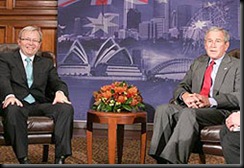WASHINGTON ( 2008-03-28 10:16:11 ) :
US President George W. Bush and Australia's new Prime Minister Kevin Rudd are set for talks on Friday expected to reinforce their security alliance despite Canberra's upcoming partial troop pullout from Iraq, officials said.
This is the first White House meeting for Rudd, who ousted Bush's friend and staunch Iraq war ally John Howard in November elections on the back of a pledge to pull 550 combat troops out of southern Iraq by the middle of the year.
Australia will still have about 1,000 military personnel in and around Iraq, including a 110-strong security detachment in Baghdad and personnel for aircraft and a warship based outside Iraq.
"The most important thing" is for the leaders to establish a good personal relationship and, in their public comments, to make it clear that bilateral ties are "strong and will endure under new leadership in Australia," said Bush's national security adviser Stephen Hadley ahead of the meeting.
Speaking to reporters, Hadley sidestepped a question on the prospect of US prodding Rudd on any further Australian troop deployment.
Hadley would only say, "Australia has been a terrific partner."
The longstanding US-Australian alliance is expected to come under severe test under the Rudd-led government after more than a decade of intimate ties during the stewardship of Howard, who had positioned Australia as among Washington's top three or four allies, experts say.
"Australia could become a more qualified or, in certain circumstances, even a reluctant actor in the American-led 'long war' against international terrorism," said a recent report by the Hawaii-based Asia-Pacific Center for Security Studies.
The Rudd government will push for multilateral regional security dialogues and mechanisms in Asia, said Australian National University professor William Tow, who was commissioned by the center to prepare the report.
This "may force the United States to adjust its own long standing bilateral security approaches in the region on such key issues as trade and arms control," he predicted.
Aside from Australia, the other US treaty allies in Asia are Japan, Australia, South Korea, Thailand, and the Philippines. Singapore, a strong supporter of US military presence in the region, allows American forces use of facilities in the island state.
Bush and Rudd had spoken on the phone earlier this month on the need to remain committed in Afghanistan and Iraq, as well as the importance of East Asian regional security, Bush spokesman Gordon Johndroe had said.
Australia has nearly 1,000 troops serving in the violence-ridden southern part of Afghanistan and has no immediate plans to add more troops.
Aside from security, Bush and Rudd are expected to discuss the turmoil in Tibet, climate change, and trade and investment issues as well as the upcoming Nato Summit in Bucharest, where the two leaders will be among participants, diplomats said.
Rudd would visit Beijing as part of his 17-day trip that would begin in Washington.
During his stay in Washington, he is scheduled to give a talk at the Brookings Institution and meet members of the US Chamber of Commerce to highlight the need to increase bilateral trade, officials said.
Both the countries have a four-year-old free trade agreement with two-way trade in goods and services totalling 44 billion dollars last year.
Among other officials, Rudd will also meet with Secretary of State Condoleezza Rice and Treasury Secretary Henry Paulson.


